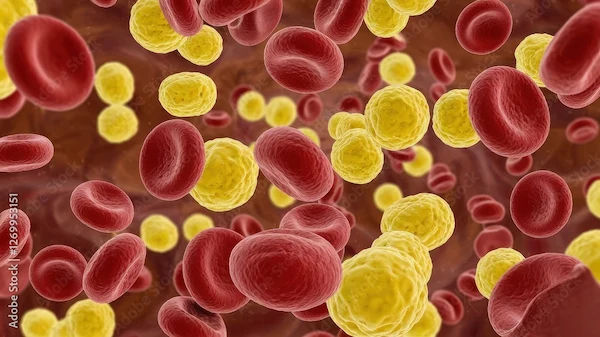Triple X Syndrome
Triple X Syndrome, also known as Trisomy X, is a genetic condition affecting females. Learn about its causes, symptoms, diagnosis, and how it may impact development and overall health.

Written by Dr. J T Hema Pratima
Reviewed by Dr. Shaik Abdul Kalam MD (Physician)
Last updated on 21st Aug, 2025

Triple X Syndrome, also known as 47,XXX or Trisomy X, is a genetic condition that affects females. It occurs when a girl is born with an extra X chromosome in her cells (XXX instead of the usual XX). While this condition is not widely known, it’s important to understand its effects and how to manage it for better health and well-being.
This guide will help you learn about Triple X Syndrome in simple terms—covering its symptoms, causes, and how it may impact health. We’ll also share helpful tips for managing the condition and when to seek medical advice.
What is Triple X Syndrome?
Triple X Syndrome is a genetic variation where a female has three X chromosomes instead of the usual two. This happens randomly during the formation of reproductive cells or early fetal development.
Not Rare, But Often Undiagnosed: About 1 in 1,000 girls are born with Triple X Syndrome, but many may never know because symptoms can be mild or absent.
Not Inherited: It’s usually a random genetic change, not passed down from parents.
Varies from Person to Person: Some girls and women with Triple X Syndrome may have noticeable symptoms, while others may not.
Signs and Symptoms of Triple X Syndrome
Symptoms can differ widely among individuals. Some common signs include:
Physical Symptoms
Taller than average height (often noticeable in childhood)
Delayed development of motor skills (e.g., sitting, walking, or coordination)
Weak muscle tone (hypotonia)
Epicanthal folds (extra skin folds on the eyelids)
Slightly wider-spaced eyes
Flat feet
Developmental & Learning Differences
Speech and language delays (may take longer to speak clearly)
Learning difficulties (especially in reading and math)
Mild delays in social or emotional development
Behavioural & Emotional Aspects
Shyness or anxiety
Difficulty with attention or focus (similar to ADHD in some cases)
Emotional sensitivity
Note: Many girls with Triple X Syndrome lead healthy lives with minimal issues, especially with early support.
Consult Top Specialists
What Causes Triple X Syndrome?
Triple X Syndrome is caused by a random error in cell division:
Non-Disjunction: Sometimes, an egg or sperm cell forms with an extra X chromosome. When fertilisation happens, the baby ends up with three X chromosomes (XXX).
Mosaic Triple X: In rare cases, only some cells have the extra X chromosome, leading to milder symptoms.
Important: Parents do not cause this condition—it happens by chance and is not due to lifestyle or environmental factors.
How Does Triple X Syndrome Affect Health?
Most girls and women with Triple X Syndrome are healthy, but some may face challenges:
Learning & School Performance: Extra support in school (like speech therapy or tutoring) can help.
Social & Emotional Well-being: Counselling or therapy may help with anxiety or social skills.
Fertility & Pregnancy: Most women with Triple X Syndrome have normal fertility, but some may experience early menopause.
Good News: With proper care and support, most individuals with Triple X Syndrome live full, healthy lives.
Managing Triple X Syndrome: Helpful Tips
If your child has Triple X Syndrome, early intervention and support can make a big difference. Here’s how you can help:
1. Early Developmental Support
Speech & Occupational Therapy: Helps with language delays and motor skills.
Educational Support: Work with teachers to create an Individualised Education Plan (IEP) if needed.
2. Emotional & Social Support
Encourage Confidence: Praise efforts and provide a supportive environment.
Social Skills Training: Helps with making friends and handling emotions.
3. Healthy Lifestyle Habits
Balanced Diet & Exercise: Supports muscle tone and overall health.
Regular Check-ups: Monitor growth, development, and any health concerns.
4. Genetic Counselling (If Planning a Family)
While Triple X Syndrome is not usually inherited, genetic counselling can provide reassurance.
When to See a Doctor?
If you notice:
Significant developmental delays (speech, motor skills)
Learning difficulties in school
Emotional or behavioural concerns
Consult a paediatrician, geneticist, or developmental specialist for evaluation. Early diagnosis helps in providing the right support.
You can book a consultation with experts at Apollo 24|7 for genetic testing or developmental assessments.
Conclusion
Triple X Syndrome is a genetic condition that varies from person to person. While some may face mild challenges, many girls and women with this condition lead happy, healthy lives with the right support.
If you suspect Triple X Syndrome in your child or yourself, don’t hesitate to seek medical advice. Early intervention, therapy, and a supportive environment can make all the difference.
Would you like to speak to a specialist? Schedule a consultation today on Apollo 24|7!
Consult Top Specialists
Consult Top Specialists

Dr. Tanmaya Kumar Sahu
General Physician/ Internal Medicine Specialist
12 Years • MBBS, MD ( Internal Medicine )
Bhubaneswar
Apollo Hospitals Old Sainik School Road, Bhubaneswar
Dr. Preethy Aparanjitham. K
General Physician/ Internal Medicine Specialist
20 Years • MBBS,MRCGP,DFM
Manikonda Jagir
Apollo Clinic, Manikonda, Manikonda Jagir

Dr. Mijanur Rahaman Mondal
General Practitioner
3 Years • MBBS
Kolkata
Dr Utsa Basu Clinic, Kolkata
(25+ Patients)

Dr. Smitha Nagaraj
General Physician/ Internal Medicine Specialist
15 Years • MBBS, Diploma in Family Medicine
Bengaluru
Apollo Medical Center, Marathahalli, Bengaluru

Divyashree K
General Physician/ Internal Medicine Specialist
5 Years • MBBS
Bengaluru
Apollo Clinic, JP nagar, Bengaluru




